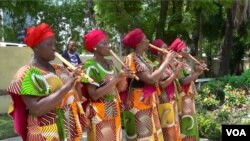"I have two boys...and I wanted them to, sort of, not have to deal with racism."
This is the quote that sticks with me the most from my time covering the Year of Return and a cultural festival known as Panafest in Ghana. Gail Nikoi, who now serves as president of the African American Association of Ghana, moved to Accra four years ago with her husband and her two teenage sons.
The sentiment struck me not so much because of the problems it reflects in the United States, but because it shows how this American family was able to be welcomed and feel as one with the Ghanaian people.
Nikoi made it clear that she loves the U.S. and that Ghana is not free of problems. But for her family, moving here was the right choice. And while it hasn't always been easy, there was a sense of homecoming from the moment she arrived.
I was taken aback by how often I heard Americans say it was easy for them to assimilate in Ghana, and black Americans say that even visiting for the first time, they felt a sense of belonging, and of coming home.
"Everybody here looks like me - that's my nose!" I overheard one woman say with a laugh.
Working on VOA's Year of Return project in the U.S., I often sensed a divide between black Americans and African immigrants. But for whatever reason, the Americans I spoke with in Ghana said that was not the case here.
"People think I'm Ghanaian until they hear me speak," I was told by Annabelle McKenzie, who moved to Accra a year ago and is currently coordinating Year of Return programming for the Ghanaian government.
The lines between the two cultures are blurred here, if they exist at all. In the hired car I rode from the capital of Accra to Cape Coast, the driver played hit songs by Dolly Parton, including "In my Tennessee Mountain Home," over and over.
And the sense of unity among those attending these events is palpable. Many of the black Americans who are visiting or have moved to Ghana don't actually know whether their ancestry is Ghanaian. But that doesn't matter, either to them or the Ghanaian organizers.
I was in Accra and Cape Coast during Panafest - a biannual celebration of PanAfrican culture and unity. This festival was particularly important this year, when one of the themes was inclusion for returnees. It doesn't matter where you're from, or where your ancestors are from - you belong here.
But the notion of belonging to a PanAfrican culture is bittersweet. Though the focus of all the events was positive, there was an inherent mourning for the ancestors who were ripped from their homes -- and for their descendants who will never really know their roots.
After Panafest kicked off in Accra, attendees and organizers traveled to Cape Coast in Ghana's central region, which houses one of the largest and most notorious slave castles on the continent.
It's called a "castle" because of the European colonizers, mostly British, who lived on the higher floors of the white building overlooking the ocean.
Our tour guide drove home the contrast between the way people lived on the upper and lower floors. When we were in the dungeon where, at any one time, hundreds of men were imprisoned in the dark without bathrooms, our guide pointed out, "There is a church directly above this room."
When he showed us the former living room of a British family he had us count the 16 windows overlooking the ocean and then said, "Remember what is beneath here?" Directly below was a smaller dungeon where slaves-to-be who had misbehaved were locked up and left to die of hunger or thirst.
Each time the tour brought us to a dungeon or holding room, the guide would turn off the lights and say, "I know this is scary. But it's important you experience this -- that you feel how dark it was."
I felt the horror of what had happened here most acutely at the "Door of No Return" -- a door leading from the castle to the dock where thousands of Ghanaians were herded onto ships, never to see Africa again. As the guide explained the purpose of the last holding room before that door, a girl on the tour vomited. It may have had nothing to do with the guide's words, but it seemed fitting.
On the outer side of the door, there is another plaque that reads, "Door of Return." In 1998, the remains of two Africans – one from Jamaica and one from New York City -- were returned to Ghana and buried in Accra. The remains were transported back through this door.
As the tour guide finished this story and we walked back from the dock, one of the tourists turned to another with a smile and said, "Welcome home, brother."






